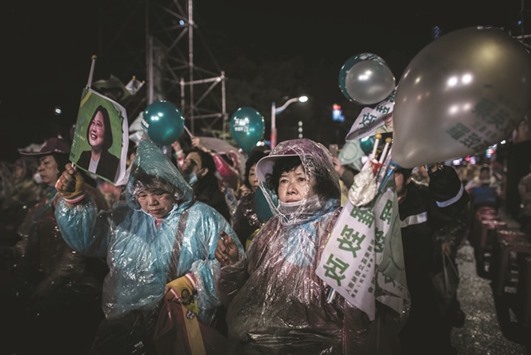Tens of thousands rallied in Taiwan yesterday night as presidential candidates made their last bid for votes in an election likely to usher in its first female leader at this weekend’s polls.
Voters are expected to turn their backs on eight years of rapprochement with China in today’s pivotal election as scepticism over closer ties with Beijing grows.
The flagging economy is also a major issue, with the public blaming the ruling Kuomintang (KMT) for failing to improve livelihoods.
Huge crowds chanted and waved flags in climactic rallies for the two main candidates, Tsai Ing-wen of the Beijing-wary main opposition Democratic Progressive Party (DPP) — who is the frontrunner for the leadership — and the KMT’s Eric Chu.
A sea of supporters shouted Tsai’s name at her rally near the presidential office, wrapped in raincoats on a cold, wet night.
The atmosphere was jubilant despite the drizzle, with crowds chanting “Tsai Ing-wen, elected!”
“This election is not about defeating anyone, it’s about overcoming the difficulty facing the country,” Tsai said.
“If you hope to see Taiwan change, please go to the polling station and vote.”
During campaigning earlier in the day she reiterated her promise to maintain the “status quo” with Beijing.
Supporters voiced their disappointment with current KMT president Ma Ying-jeou and his Beijing-friendly approach.
“Ma did not bring happiness to his people,” said 63-year-old accountant Fu Ren-chih.
“His pro-China policies are bad for Taiwan.”
Taiwan has been self-ruling since it split from China after a civil war in 1949, but Beijing still sees it as part of its territory to be reunited, by force if necessary.
In a pragmatic move, Tsai has toned down the party’s traditionally pro-independence message, but her opponents say China ties will inevitably deteriorate if she takes power.
The unprecedented thaw under Ma culminated in a summit with Chinese President Xi Jinping in November. Ma must hand over the reins this election as he has served a maximum two terms.
KMT candidate Chu is trailing in the polls but a mass of supporters gathered yesterday night in New Taipei City, where he is mayor.
Singers and dance troupes entertained the crowds who said they still had faith he could win.
“I believe Chu will lead Taiwan to a better place. He has a newer way of thinking,” said supporter Chen Chia-wei, 54.
“I think we still have a chance,” added Paige Lin, 48, who works in the electronics industry, saying she would vote for Chu “for our next generation, for people on both sides of the strait”.
Chu has consistently played the stability card in campaigning.
“For our shared desire for social stability, economic prosperity and cross-strait peace, please everyone must come out and vote,” Chu urged supporters at the rally.
Beijing said yesterday that it would not diverge from its “one China” approach to Taiwan.
The principle is the bedrock of warming ties between the KMT and Beijing, enshrined in a tacit agreement between them known as the “1992 consensus”.
The agreement recognises “one China” but allows each side its own interpretation — the DPP has never endorsed it.
“We want to stress that we always uphold the ‘one China’ policy,” said China’s Ministry of Foreign Affairs spokesman Hong Lei at a regular briefing.
“No matter what changes take place in Taiwan, this position will remain unchanged.”

Supporters of Democratic Progressive Party (DPP) presidential candidate Tsai Ing-wen attend an election rally in New Taipei City yesterday.
